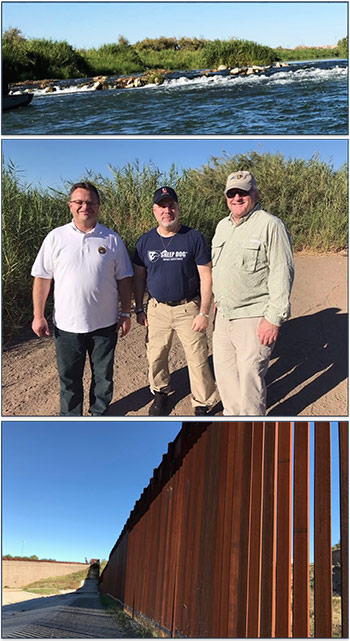Contact Us
To provide feedback on the Community Policing Dispatch, e-mail the editorial board at CPDispatch@usdoj.gov.
To obtain details on COPS Office programs, publications, and resources, contact the COPS Office Response Center at 800-421-6770 or AskCopsRC@usdoj.gov

U.S. Department of Justice
Office of Community Oriented Policing Services
Washington, DC 20530
 The holiday season is a time of good cheer, when we get together with friends and family for celebrations of many kinds. But it is also a time when violent crimes, thefts of illegal drugs, drunk driving, and other problems increase—and therefore a busy season for law enforcement. I want to take this opportunity to express our gratitude to all of our nation’s law enforcement agencies for their efforts in maintaining public safety this month as well as throughout the year.
The holiday season is a time of good cheer, when we get together with friends and family for celebrations of many kinds. But it is also a time when violent crimes, thefts of illegal drugs, drunk driving, and other problems increase—and therefore a busy season for law enforcement. I want to take this opportunity to express our gratitude to all of our nation’s law enforcement agencies for their efforts in maintaining public safety this month as well as throughout the year.
I would also like to salute two local law enforcement groups in particular for the excellent work they are doing to keep our entire nation safe. One of them is the North Texas Crime Interdiction Unit (NTXCIU). As you will see in this month’s featured article, they have been very innovative in their use of collaboration. By assembling a multijurisdictional team of specialized highway patrol officers, the NTXCIU has been remarkably successful in reducing the amount of human trafficking and illegal drugs flowing through their counties and on to the rest of our country. All of us in the COPS Office applaud their dedication, skill, and ingenuity.
I also want to call attention to the efforts of the local and federal law enforcement agencies on our southwest border, who are working tirelessly to stop human trafficking and illegal drugs where they most often enter. On a recent visit to southeastern Arizona, I had the privilege of meeting with the men and women who are at the forefront of these efforts, and I was both astounded at what they are up against and amazed at their courage and dedication to their jobs.
On this visit, I met with local border sheriffs, their Customs and Border Patrol (CBP) counterparts, and representatives from state and local law enforcement, as well as officials from the U.S. Department of State, the National Sheriff’s Association, the Department of Homeland Security, and other federal agencies. During the day-long meeting, I also heard from ranchers and local business and community leaders. All voiced great concern specifically about the increase in fentanyl trafficking, which is now the biggest drug threat in our country. According to some estimates, seizures of this deadly drug increased nearly five times in the last year.
They also called for additional resources in personnel, equipment, and technology, which have not increased in supply as the need has grown. One sheriff estimated that 40 percent of his agency’s financial and staffing resources are directed to addressing border-related issues, which detracts from the ability to focus on local crime reduction and community policing efforts. The ancillary local costs of dealing with illegal immigration, including the increase in prosecutorial activities and incarceration, is stressing both public and private resources.
Although they are in great need of additional support, the sheriffs and their local and state partners have worked to be as innovative and creative as possible in devising a unique program: the Southeastern Arizona Border Region Enforcement (SABRE) team. This collaborative task force has energized its members’ efforts to combat the increased crime, suicides, fatal overdoses and other consequences of drug smuggling that plague our communities while also enhancing the security of those living and working along the border.
I am heartened by the spirit of innovation and unwavering dedication of Cochise County Sheriff Mark Dannels, Pima County Sheriff Mark Napier, Yuma County Sheriff Leon Wilmot, and their local and state law enforcement colleagues. And I applaud their strong working relationship with CBP and other federal law enforcement agencies. We are grateful for their efforts to keep the drugs coming through our nation’s borders from arriving in our communities. I have pledged the support of the COPS Office to do whatever we can to assist state and local law enforcement in this critically important work.
– Director Keith
Subscribe to Email Updates
To sign up for monthly updates or to access your subscriber preferences, please enter your email address in the Subscribe box.






